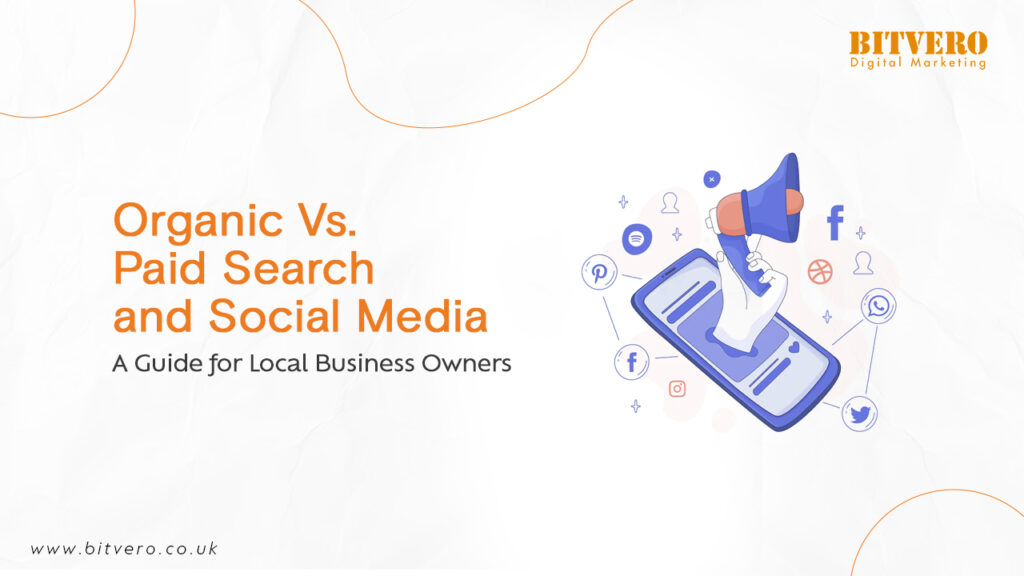Organic Vs. Paid Search and Social Media: A Guide for Local Business Owners

Most small businesses that want to promote their businesses locally via digital marketing face confusion about whether to use search engines or social media.
When options are great, they have pros and cons. These can tilt your decision to any of them to a certain extent. This is specifically if you have budget, resources, or even timing constraints.
In this scenario, the best thing is to understand their good and bad better and then only make the decisions accordingly.
Let’s see them so you can identify which one can yield the best outcome for your local area business marketing.
Organic Marketing
Organic marketing is when you are not paying any amount to show business to online users.
That means you use free-to-use platforms.
Most of the time, these are search engines, while online forums like Quora and Reddit are also part of it.
As said, they are free to index your presence. However, this yields outcomes in the long run, which is a slight drawback if you are desperate for visibility.
But if you are ready to put in all the effort and have patience, then it is the best option, we would say.
You can start this through a website design and rank it higher on Google or other search engines you want using SEO strategies.
Apart from this, you can also opt for an e-commerce website design if the purpose is to sell.
Moreover, Local SEO is also an effective organic strategy. This helps list your business on Google for local queries through the GMB profile. As it is free to register, it is a good start for any small business.
Google My Business not only makes you appear in online queries, but with your basic details like phone number, address, etc., it increases the probability of more people visiting your storefront, which becomes crucial if you haven’t yet opted for a web design service.
Besides this, other Local SEO strategies include listing your business on local online directories so that when someone searches for something relevant to your business, it appears.
Read also: The Future of Paid Advertising: AI, Automation, and Personalization.
Paid marketing
Unlike organic marketing, paid search marketing also occurs on search engines like Google or Microsoft. The only difference is that it isn’t free. You have to pay for it. Google PPC ads or Microsoft advertising. Also, they aren’t meant for a lifetime, but until you have a budget to run them.
They can be a part of your marketing strategy if you want quick visibility for your business in the local area. Though many companies use paid ads for broader locations or audiences at national or international levels, their ability to let you select the precise location makes them a highly effective marketing strategy for any local business.
However, creating such paid ad campaigns is a bit complex as these ads rely on the pay-per-click model. That means you have to adjust the budget accordingly and write ad copies so effectively that they yield the most out of the least.
So, we suggest that if you are in your business’s initial stage, it is better to go for organic marketing like SEO or a website. Moreover, if you are in a hurry for quick ROI through such paid ads, you can use a PPC management company that can run the ads on your behalf.
Related article: Google Ads Trends Coming In 2025
Social Media
Like search engine marketing, social media marketing has both organic and paid aspects. Depending on your budget and needs, you can choose any. Whatever you go with, both have the potential to market your business to your local audience—thanks to algorithms’ precision.
Organic social media basically means creating a social media account, developing a content strategy, and posting. However, it is not that simple and includes more than that, like proper social media optimisation, a hashtag strategy, audience engagement, the right time to post, analysing insight, etc.
The difference is you are not paying any amount to the platform itself——-just your precious efforts.
On the contrary, social media marketing is specifically paid ads that you run to boost any post.
So, if the algorithm itself does not make your post reach more people, you pay a set budget for a set amount of reach. This is a give-and-take model.
You can say they are kind of PPC ads but on social media in place of search engines. However, here, instead of paying per click (PPC) for an ad, you get CPC or cost per click.
Simply put, PPC is the amount you pay per action after getting it. CPC is when you pay the total amount at once, and algorithms adjust it per action accordingly.
PPC (Pay-Per-Click) is charged only after the action (like a click) takes place. CPC is the average cost you have charged per action out of your budget during a campaign. It’s calculated after the campaign by dividing the total spend by the number of clicks. Mostly, algorithms dictate or adjust it accordingly based on different factors like quality or competition.
However, the trick is that the more effective your content or ad, the less the CPC will have to pay.
However, not in every social media ad case do you have to pay the CPC, as the pricing model may differ according to your ad goals, such as brand awareness. Your social media marketing agency can help you choose the right goal according to your needs.
To sum up, you can promote your local business on social media through paid ads or organic efforts that fit your budget and needs.
That’s it
Thank you for reading! If you find the information helpful, please subscribe to our blog. Plus, if you are looking for a digital marketing company in London to promote your business in your local area, you can get in touch with us.
